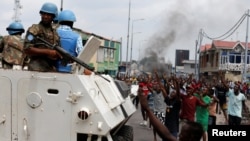Talks to ease Congo President Joseph Kabila out of power next year and quell protests over him overstaying his mandate are hanging by a thread, an opposition leader said ahead of the resumption of the negotiations Friday.
Only last week, the sides appeared near a historic deal that could have paved the way for the first peaceful transfer of power through a democratic election since the country gained independence in 1960.
However, the talks hit a stumbling block over whether a new prime minister for Democratic Republic of Congo will come from the main opposition bloc and on the composition of the electoral commission, which the opposition accuses of pro-government bias.
"At this stage, we are closer to a rupture than to a solution," opposition leader Felix Tshisekedi said in a tweet.
Other parties and mediators made no comment.
The talks between the ruling coalition and opposition parties organized by the Catholic church are set to resume for a make-or-break day at the headquarters of the conference of Catholic bishops in the capital Kinshasa.
Delegates said bishops acting as mediators met Kabila and veteran opposition leader Etienne Tshisekedi on Thursday.
Under the deal, Kabila would agree not to attempt to change the constitution to participate in elections to be held next year. His two-term mandate ended Dec. 19, but authorities have effectively extended it until 2018.
That would have represented a significant turnaround given that security forces killed around 40 people last week for protesting the tenure of a leader who came to power in 2001 when his father, Laurent, was assassinated.
The opposition also wants authorities to drop charges against some of its leaders, arguing that the prosecutions are political.
A political deal could boost pro-democracy activists in other countries, given Congo's size and sway on the continent.
But if the talks break down, it could lead to more violent demonstrations. Police spokesman Colonel Pierre Mwanamputu said security was being stepped up for the New Year celebrations and to guard against unrest.
Millions died of starvation and disease in a war in Congo between 1996 and 2003 that sucked in a host of other African nations.





